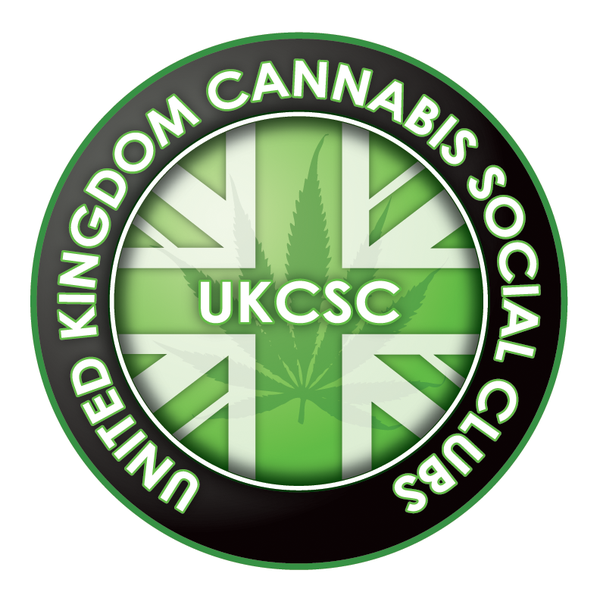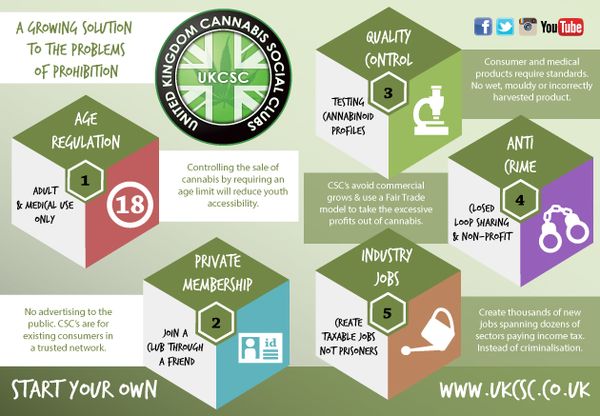- The UKCSC is a platform created in the year 2011 by British citizens concerned about the legal framework of cannabis at national and international level.
- An organisation that unites and represents the existing cannabis clubs in the United Kingdom and which is also a meeting point for health workers, industry professionals, experts, entrepreneurs and activists, all of whom share something in common: the cannabis plant.

In a context as difficult as the one in the United Kingdom, with one of Europe's most prohibitionist legislations, the UKCSC was created in order to respond to the needs and concerns of those who believe there is another way of doing things, that the regulation of cannabis is the best way to avoid the risks involved in the consumption of this substance and that prohibitionism just favours illegal distribution networks and fosters crime. We interview Chris MacKenzie, one of its members, so he can explain more about this project that fights for the regulation of cannabis in the United Kingdom.
When and why was the UKCSC created?
This movement started in 2011, when a few people who were concerned about the legal framework of cannabis got together to create what is now the UKCSC. We realised that in Spain the cannabis club model had worked and we wanted to apply that in the UK. Cannabis clubs don't discriminate between recreational and medicinal use; all uses are acceptable provided they are carried out responsibly.
What are your goals?
Our goal is to replace illegal distribution networks with a regulated system integrated in our society, and we're also focused on offering information to users, for example explaining what THC and CBD are, the effects and properties of each substance, or the differences between sativa and indica strains. Apart from that we organise activities for club members, public events such as football matches, etc.
How do these clubs operate in the UK?
At the moment it's quite complicated and confusing. In the UK the clubs are present at different levels; some are just Facebook pages, others consist of a couple of people operating in London and others are proper clubs that you can go to... Each club is organised in its own way. What they all share is the idea of getting away from the black market, of being self-sufficient.
The UK has one of the most prohibitionist positions with respect to cannabis in Europe. Why do you think this is?
In my opinion it's this obsession with being seen to be "correct"; I think that over the years, the huge amount of information put out by the media has created an irrational fear of drugs that has spread through society. There aren't any positive stories related to cannabis in the news; well, there may have been a few more lately, but they're still very few.
In this context, how is it possible for there to be cannabis clubs in the United Kingdom? What is their legal situation right now?
The legal situation is that these clubs are registered as legal entities, as clubs. The clubs try to stay within the law, but possession is illegal, so that's why they're still operating in a very underground way for the time being.
The good news is that cannabis clubs are being recognised as a viable regulation model by many people, so we hope that one day they can be a legal reality. My wish and that of all of us involved in this movement is that one day we can go for the most responsible choice, the cannabis club model. It's what makes the most sense, to start with because the risks associated with the consumption of cannabis increase with the black market. You're buying marijuana where you don't know how it's been grown, what pesticides or chemical products it contains, fungi, etc. In turn, associations offer clean grass, clean extractions, products free from toxic substances that harm our health; that's what we're after.
Financially speaking, how do you think the regulation of cannabis would affect the UK?
I think that cannabis regulation is a huge economic bubble that's about to burst; when we start using cannabis properly it's going to be amazing. The therapeutic applications are incredible, as well as the industrial applications of hemp, nanotechnology, etc.
Do you think that the media are hindering the process to regulate cannabis? Why?
The media are focused on explaining the negative aspects of cannabis, on making it look like the general opinion is against regulation. I think the media are simply not interested in explaining certain stories, they're not interested in telling the world about the case of a patient who took CBD oil for two months and who thanks to this has seen their tumour shrink. This doesn't sell, there's no interest, so what we're doing is creating our own media to spread this information that's the other side of the coin.
We found this information on your website: "Cannabis policing in the UK is statistically racist and disproportionately targets and punishes black people 6 times more harshly than white people." Where do these figures come from? What do you think causes this?
What we normally do is contact the police to request this type of statistical information which is, and should be, in the public domain. Anyone interested can consult it.
I can tell you about my personal experience. At an event we organised in Glasgow, there were undercover police and all the people they questioned or searched were black. It was funny, because most of the people attending the event were white, so there was clear discrimination. They were supposedly teaching them a lesson but they were clearly criminalising them.
There are changes taking place at a legal level in many countries around the world: Canada, Uruguay, the United States. Do you think that the legalisation of cannabis in the United Kingdom will also happen soon?
Yes, I do. I'm optimistic about 2017, I reckon that within a couple or maybe three years we'll see real changes. There's loads of positive evidence related to cannabis that is coming to light, look at the Product Earth Expo for example, there's already been a second edition, a cannabis fair would have been unthinkable in England a few years ago and now it's a reality. Just when the endocannabinoid system that we all have in our organism is discovered and understood, it's a crime to not allow access to a plant that can benefit our health so much. Everyone should have access to it, should be able to grow it and not have to deal with drug traffickers in the black market.
Users would benefit from the regulation of cannabis, to start with they'd know how much THC or CBD there is in the product they're purchasing. CBD is effective for treating loads of illnesses, so medical users should know the content of what they're going to consume.
What's does the future hold for cannabis clubs in the UK? Do you reckon they'll be legal some day?
Yes, when marijuana becomes legal, cannabis clubs will be a good model to follow; they don't pursue commercial goals, just regulated and safe access to the plant.
In Spain the High Court has issued three rulings against cannabis clubs in recent months. It's the first time in the ten years of history of the clubs that this happens and it seems that they have two choices: to reinvent themselves or die. Do you think that this decision will somehow affect British clubs?
Well, I think all cannabis clubs are pioneers in what they're doing, which is to show that there's an alternative and that responsible use of cannabis is possible. At the end of the day they're not following any examples because there aren't any, history is being written as we speak, no one knows what will happen.
Do you think that the so-called "CBD wave" can make a positive contribution to the regulation of cannabis?
Yes, I do. After the case of Charlotte Figi, and that doctor Sanjay Gupta told the whole world about the therapeutic properties of CBD, the path towards the complete regulation of marijuana has been significantly cleared.




Comments from our readers
There are no comments yet. Would you like to be the first?
Leave a comment!Did you like this post?
Your opinion about our seeds is very important to us and can help other users a lot (your email address won't be made public).